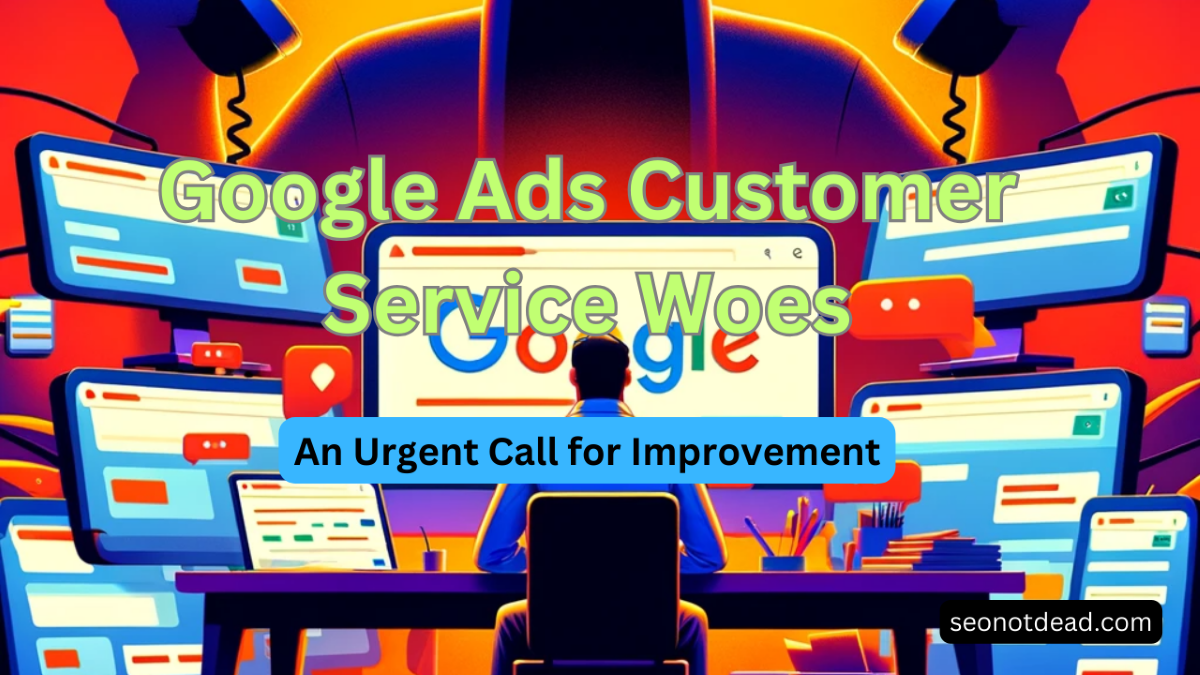In the dynamic world of digital marketing, Google Ads stands as a cornerstone for many businesses, providing a crucial platform for advertising and customer engagement. However, a troubling trend is emerging, as highlighted in a recent Search Engine Land article. Marketers across the spectrum are voicing their dissatisfaction and frustration with Google Ads customer service, an issue that’s becoming increasingly hard to ignore.
A Cascade of Issues
Marketers are facing a multitude of challenges with Google Ads. The grievances range from incorrect account suspensions to unresponsive representatives, and a troubling lack of knowledge about the platform’s features. Adding to the frustration are unwelcome sales calls aggressively pushing for automation. These issues aren’t just minor hiccups but significant obstacles impacting marketers’ ability to effectively manage their campaigns.
Voices of Frustration
The article brings to light the experiences of various marketing professionals. Mike Kelley, Chief Marketing Officer at Sylvan Learning, points out the difficulties in purchasing YouTube ads and a glaring lack of support from both agencies and Google representatives. Similarly, Justin Lincoln, Digital Advertising Manager at Closed Loop, shares his ordeal with misinformation and communication gaps, particularly regarding opting out of the Search Network. These experiences are not isolated incidents but reflect a broader trend of dissatisfaction.
Google’s Response and the AI Promise
Acknowledging these issues, Ginny Marvin, a Google Ads liaison officer, admits to the negative feedback. She hints at future improvements powered by AI but stops short of providing a specific timeline for these changes. This vague promise leaves marketers in a state of uncertainty, questioning whether AI solutions can effectively address their concerns.
The Dilemma for Marketers
Currently, Google advises dissatisfied marketers to provide feedback through the Ads Help Center, appeal unfair account suspensions on the same platform, and file official complaints if necessary. However, Georgi Zayakov, Team Lead SEA / Amazon at The Reach Group, highlights a critical concern: the fear of repercussions. Many marketers are hesitant to file complaints, worrying about potential damage to future collaborations with representatives.
Key Questions and the Path Forward
This situation raises several critical questions: Can Google’s AI-powered solutions truly address these concerns? Will the increasing reliance on automation alienate experienced marketers who value human interaction and problem-solving skills? And importantly, how can Google encourage honest feedback without the fear of reprisal?
The need for Google to improve its Ads customer service is undeniable. The company must tackle the underlying issues causing frustration among marketers and implement solutions that genuinely support their needs.
A Call to Action for Marketers
For marketers grappling with these challenges, the article serves as a valuable resource. It underscores the importance of voicing concerns and exploring alternative solutions when necessary. In an era where customer service can make or break a platform, it’s crucial for voices in the marketing community to be heard and for action to be taken.
In conclusion, the article sheds light on a critical aspect of digital marketing – the need for effective and responsive customer service in platforms like Google Ads. As the landscape continues to evolve, it’s imperative for Google to address
these issues head-on, ensuring that its customer service not only meets but exceeds the expectations of today’s digital marketers. The future of Google Ads depends not just on its technological prowess, but equally on its ability to nurture and maintain positive relationships with its user base.
Embracing Change and Collaboration
For Google, this moment presents an opportunity. By listening to the voices of marketers and embracing changes that enhance human interaction and support, Google can reaffirm its commitment to its users. This means going beyond AI and automation, ensuring that there is a human touch where it’s most needed. It’s about creating a balance – leveraging technology for efficiency while retaining the human element for complex problem-solving and relationship building.
The Power of Community Feedback
For marketers, the situation underscores the power of community and collective feedback. By openly sharing experiences and challenges, marketers can not only help each other but also push platforms like Google Ads to evolve and improve. It’s a reminder that, in the digital age, the customer’s voice is powerful and can drive significant changes.
Navigating the Current Landscape
In the meantime, marketers must navigate the existing landscape with savvy and resilience. This includes exploring alternative advertising platforms, leveraging peer networks for advice and support, and continuously adapting strategies to overcome the challenges posed by current customer service limitations.
Also Read: Google Ad manager: The ultimate tool for streamlining your Ad operations
Looking Ahead
As the digital marketing landscape continues to grow and change, the relationship between platforms like Google Ads and their users will remain a critical factor in their success. The current challenges present a unique opportunity for Google to lead by example, showing how a tech giant can effectively respond to and grow from user feedback.
In conclusion, while the current state of Google Ads customer service poses significant challenges, it also opens the door for meaningful dialogue and change. For Google, it’s a chance to strengthen its relationship with marketers. For marketers, it’s an opportunity to advocate for their needs and shape the future of digital advertising. As we move forward, the collaboration between these two forces will be key in creating a more effective, responsive, and user-centric advertising landscape.
- Google Ads Customer Service Woes: An Urgent Call for Improvement - January 17, 2024
- Microsoft Copilot Levels Up: Introducing Copilot Pro for $20/Month - January 17, 2024
- Understanding SEO Perfection According to Google’s John Mueller - January 2, 2024

